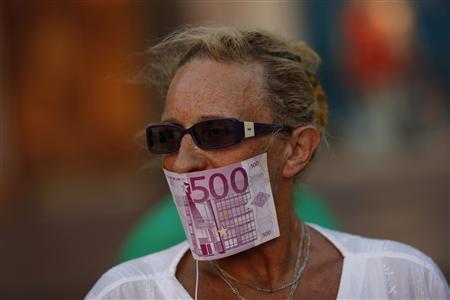(Reuters) – Spain faces supervision by international lenders after a bailout for its banks agreed at the weekend, EU and German officials said on Monday, contradicting Prime Minister Mariano Rajoy who had insisted the cash came without such strings.

Financial markets responded with relief to Saturday’s euro zone deal to lend Madrid up to 100 billion euros ($125 billion) to recapitalize debt-laden banks, with investors scooping up battered financial shares.
The euro and European stocks jumped, with the Madrid stock exchange opening up 5.3 percent and the euro zone STOXX banking index rising 4.5 percent in early trade.
Spanish and Italian bond yields fell after the deal eased fears of a run on Spanish banks. But previous “bailout bounces” on financial markets have been short-lived, often fizzling within a day or two as investors anticipate the next flare-up in the euro zone’s unresolved debt crisis.
Greece’s general election next Sunday could rapidly change market sentiment if radical leftists hostile to the austerity terms of Athens’ EU/IMF bailout outpoll the mainstream conservative and centre-left parties that signed the deal, or the vote ends in another deadlock.
Rajoy said on Sunday Madrid had scored a victory by securing aid from euro zone partners without having to submit to a full state rescue program, saying Spain’s rescue had “nothing to do” with the procedures imposed on Greece, Ireland and Portugal.
But EU Competition Commissioner Joaquin Almunia and German Finance Minister Wolfgang Schaeuble said that as in those other bailouts, a “troika” of the International Monetary Fund, the European Commission and the European Central Bank would oversee the financial assistance.
“Of course there will be conditions,” Almunia told Spain’s Cadena Ser radio. “Whoever gives money never gives it away for free.
The IMF would be fully involved in monitoring Spain’s program even though it was not contributing funds, and banks that received aid must present a restructuring plan, he said.
Schaeuble told Deutschlandfunk radio: “The Spanish state is taking the loans, Spain will be responsible for them… There will likewise be a troika. There will of course be supervision to ensure that the program is being complied with, but this refers only to the restructuring of the banks.”
UNDER SURVEILLANCE
Spanish state finances are already under European Commission surveillance under the EU’s excessive deficit procedure.
Dutch Finance Minister Jan Kees de Jager said in a letter to parliament that the loans would add to Spain’s public debt, and he had insisted on full IMF involvement.
“It was essential for the Netherlands that the IMF will be involved in the whole process: reviewing the formal support request, determining the conditions, and monitoring progress,” he wrote.
The Spanish government said it would stick to this year’s borrowing program on financial markets. Spain still needs to refinance 82.5 billion euros of debt maturing by the end of the year, with a big hump at the end of October, and the autonomous regions have a further 15.7 billion euros of debt maturing in the second half of 2012. The central government and the regions also have to fund a deficit of about 52 billion euros this year.
The bank rescue package will add up to 10 percentage points to Spain’s debt-to-gross-domestic-product level, taking it close to 90 percent, while the country faces a grinding recession, with nearly one worker in four unemployed.
Some economists believe Spain will eventually need a full state bailout, and that Italy may be next in line because of a similar combination of high debt and no economic growth, despite reforms initiated by Prime Minister Mario Monti.
Italian Industry Minister Corrado Passera dismissed the idea that Rome might need external help at some point.
“Italy has done what was necessary to save itself in past months,” Passera, a former banker, told reporters in Milan, saying austerity measures taken so far had positioned Italy as “among countries better placed to deal with the financial turmoil Europe finds itself in”.
CHINA SCOLDS
China, to which Europe has looked largely unsuccessfully for financial support, said on Monday that the euro zone deal for Spain was a useful short-term fix, but urged the bloc to take more decisive action to safeguard longer term stability.
“This can be of great use in controlling short-term risk,” Vice Finance Minister Zhu Ghuangyao told a news conference. “But, in the interests of mid- or long-term stability, we hope the euro zone will improve consensus and take more decisive action.”
The Chinese critique of Europe’s slow-moving steps towards a more robust fiscal union closely mirrored comments by United States officials worried that the euro zone debt crisis is crimping world economic recovery and hitting President Barack Obama’s prospects of re-election in November.
U.S. Treasury Secretary Timothy Geithner welcomed the euro zone support for the recapitalization of Spanish banks as “concrete steps on the path to financial union, which is vital to the resilience of the euro area”.
China’s People’s Daily, the mouthpiece of the ruling Communist Party, scolded Europeans for making such heavy weather of their financial problems.
“Fundamentally, Europe is facing a problem of systemic integration and survival. Overcoming the crisis depends on whether the debt-ridden countries can decide on painful reforms and rouse their spirits to tackle them,” said a commentary signed “Zhong Sheng”, or “Voice of China”, often used to give the paper’s view on foreign policy.
European Union leaders will discuss longer-term plans for deeper euro zone fiscal and banking union at a summit on June 28-29, as well as measures to revive growth. But the more ambitious reforms would require treaty change that would take months, if not years, to approve and implement.
Finnish Prime Minister Jyrki Katainen told Reuters in an interview that the timely rescue for Spanish banks would make it easier to limit contagion from countries such as Greece.
“We have managed to avoid a major crisis but the problems are still there. Sovereign debts is still there and even though governments have done a good job, markets haven’t valued them,” Katainen said. “The pressure on Italy hasn’t been that high and maybe the market has assessed better what the Italian government has done.”
(Additional reporting by Lucy Hornby in Beijing, Fiona Ortiz in Madrid, Blaise Robinson in Paris,; Writing by Paul Taylor; Editing by Peter Graff)





